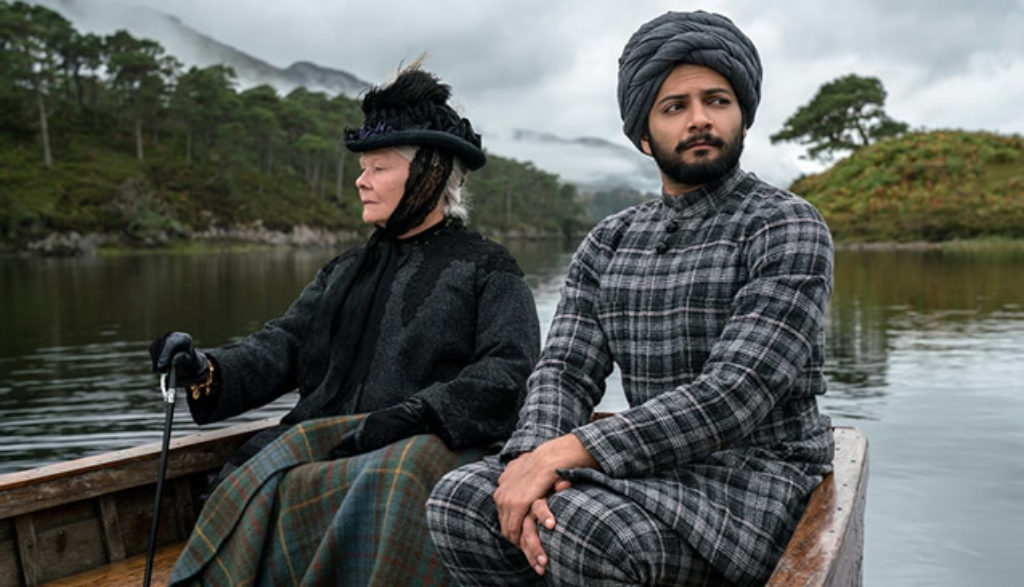
In 1887, Britain’s Queen Victoria celebrated 50 years on the throne, her Golden Jubilee year. She wanted representative faces from throughout the British Empire present with her to mark the event.
Meanwhile, the Indian city of Agra—home to the famed Taj Mahal—bustles with trade and activity. And though life in India is not easy for many, two men’s lives are about to change in ways they scarcely could have dreamed. Abdul Karim, a clerk at the local jail, and his friend Mohammed Buksh, are selected by the British Empire to serve Queen Victoria … in England.
Upon arriving in Britain, Abdul and Mohammed find life vastly different from everything they’ve ever known. The sky is darker, the weather colder, the dress strange and the mannerisms of everyday life a mystery. And if those changes aren’t hard enough, they’re now serving a monarch whose rule overthrew their own government some 30 years before.
Tall, lively Abdul practically bursts with excitement over this new adventure. But all Mohammed can think of is the life he’s left behind.
One day, dignities from all over Europe arrive at Windsor Castle to pay homage to Queen Victoria. Having been trained in all customs of service, Abdul and Mohammed are instructed to enter the dining area, lay down the ceremonial gift of one Indian rupee and back away quickly. But the most important instruction? They must never lay eyes on the Queen. But as Abdul backs away, he breaks the most important rule and glances upward, locking eyes with the Queen.
Queen Victoria temporarily forgets the scandalous incident. Until, that is, she’s asked how she likes her two new Indian servants. After some thought, she recalls that she liked the tall one, Abdul, saying that he was “quite handsome.” Soon thereafter, Abdul is asked to be the Queen’s personal servant, while Muhammed remains a common servant.
Queen Victoria—discontent, lonely and bored with her ritualistic life—is captivated by the stories that Abdul, who’s a Muslim, tells her about his world and culture. Soon he becomes the Queen’s teacher, or Munshi, and begins to teach her about the Koran, the writings of Muslim poet Rumi and how to write in Hindi. Life and joy begin to flow through the Queen’s veins once again, as she realizes she hasn’t truly “lived” in years.
But not everyone shares her affection for the new Munshi. Or, for that matter, his family, which has by now joined him in England. In fact, most of those in the Queen’s court are inherently opposed to “the Indian” providing any sort of counsel or friendship to the monarch. And as their friendship grows, so do the levels of jealousy, antipathy and racial tension in the royal household.
Influential members of the Queen’s administration believe Abdul must go. They plot extreme measures to make it so, twisting Abdul’s words and causing a rift between Victoria and her servant.
But in the end, nothing—not even an incident manufactured to foster mistrust—can break the bond that Victoria and Abdul share.
From beginning to end, Abdul is the unwavering epitome of loyalty in his service to Queen Victoria. His devotion to her is constant, not interrupted by a desire to return home or by the many challenges he faces as a foreign servant. When the Queen experiences a rare moment of weakness, he encourages her by saying, “We are here for others.” Indeed, serving others well is Abdul’s life purpose. Girded by that sense of calling, Abdul serves the Queen faithfully in a way that helps transform her from a lethargic, lonely, discontented woman to a lively, hopeful individual.
Abdul emphasizes the values of unity and love as he teaches the Queen that “life is like a carpet,” saying that we all weave in and out of the fabric of one another lives. He describes how we are stronger together than apart. And the film suggests that when we set aside all of our prejudices, we become like a beautiful Indian rug: intricate, bright and beautiful.
Abdul helps Queen Victoria, who desires a “simple, rudimentary life,” see that we are not “all prisoners,” and that we can either choose to create a prison for ourselves or choose to be set free by embracing the life we live. To thank Abdul for his friendship and counsel, the Queen gives him a locket which contains her photograph—a locket that he treasures the rest of his life.
As Abdul continues to reside in the royal household, his family is brought from India by the Queen, who demands that he be treated as an equal. She makes sure he feels at home, hanging up portraits of what he most loves, and taking him on royal and family outings.
Tensions in the royal household gradually mount. The Queen tells the three men trying to get rid of Abdul—Sir Henry; her son, Bertie; and Dr. Reid—to repeat the phrase, “I will be courteous to the Munshi.”
Later, nearly everyone working for the Queen threatens to leave her service because of Abdul’s “unwelcome stay” and swirling rumors about the possibility of knighthood for him. But in a dramatic confrontation, the Queen lines up her staff, tells them they may leave if they’d like, but says that Abdul is going nowhere. In fact, she says, he will be added to the Royal Victorian Order. Throughout the film, Victoria battles the prejudice and racist notions many (if not most) members of her staff possess.
Abdul’s devotion to his Queen is so great that when she asks him to return to India to live out the rest of his days, he says that he will never leave her side. Victoria responds, “You are a fool, but I adore you.”
Elsewhere, Mohammed defends Abdul’s honor as he is interrogated by Sir Henry and Bertie. Mohammed will only speak positively of Abdul, and the men leave frustrated.
Abdul, born into a Muslim family, offers to teach Queen Victoria about the Koran. He tells her that he has memorized it, a feat that is not uncommon in India. On the Queen’s deathbed, Abdul consoles her by saying, “We belong to Allah, and to him we shall return.” Those words seem to console her in that moment. Mohammed, also a Muslim, considers the British barbaric because they “eat pig’s blood.”
The Queen, for her part, refers to heaven as “the banquet hall of eternity.” A crucifix is visible as she lies on her deathbed. Someone exclaims, “What the devil?”
The Queen is concerned that Abdul and his wife have not yet conceived any children. So she instructs Dr. Reid to do a check up on Mrs. Karim “to make sure everything is working.” But Abdul’s wife is draped from head to toe in a burka (a traditional Muslim covering worn by women), and Abdul tells Dr. Reid he will not be allowed to examine her. The doctor does examine Abdul and discovers that he has gonorrhea, findings he reports to the Queen.
Paintings in the Queen’s residence (seen in the background) may include some nakedness.
One of the men who’s been ordered by the Queen to treat Abdul courteously shoves him up against a wall with his hands on Abdul’s throat. Abdul’s wife and mother-in-law are also forcefully removed from their own home by Bertie, who breaks in on them (and sees Mrs. Karim without her burka, another cultural violation). Abdul is thrown to the ground as well.
Mohammed, who struggles greatly with Britain’s colder climate, eventually dies and is buried by Abdul.
Three s-words. God’s name is taken in vain three times, and Jesus’ name is misused once. The words “h—,” “s-dding” and “d–n” are used two or three times each. We see “a–ehole” spelled out in a translated caption. We hear a couple uses of the British vulgarity “bloody” as well. There are two extremely crude references to the male anatomy, both in a degrading or threateningly context.
Dignitaries, including the Queen, consume champagne, wine and other alcoholic beverages. Bertie is drunk when we first see him. One character is given pills for anxiety.
The Queen talks to her doctor about problems with her “royal colon” twice. Some courtiers quietly wonder when the Queen will die. One character says that Abdul’s skin color is “degrading [to] the royal household.”
In some ways, Victoria and Abdul feels a bit like a real-life fairy tale come true. But in this story, happily ever after proves more elusive for Abdul, who (along with his family) is ultimately forced to return to India. His loyal years of service are essentially erased from history when the Queen’s son, Bertie, then orders correspondence between Victoria and Abdul to be burned.
In fact, it wasn’t until 2010 that historians discovered some private journals that had survived, and Victoria and Abdul’s unlikely friendship was brought fully to light. (Their relationship was chronicled in Shrabani Basu’s 2011 book Victoria & Abdul: The True Story of the Queen’s Closest Confidant, from which this movie draws its narrative details.)
This biopic depicts the mundane, human side of what life was probably like for Queen Victoria. Namely, the hardships she endured and the lonely road she walked during her 63-year reign on England’s throne. The story also uncovers the prejudices and racist tension in Britain at the time, while highlighting the beauty and importance of loving those who have a different ethnic or cultural background.
Victoria and Abdul illustrates how to love others and stand up for their rights when they do not have a voice of their own. And although we hear some questionable language along the way, the movie’s messages about having someone to encourage, support and breathe life back into us still come through loud and clear.


Kristin Smith joined the Plugged In team in 2017. Formerly a Spanish and English teacher, Kristin loves reading literature and eating authentic Mexican tacos. She and her husband, Eddy, love raising their children Judah and Selah. Kristin also has a deep affection for coffee, music, her dog (Cali) and cat (Aslan).